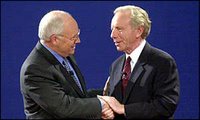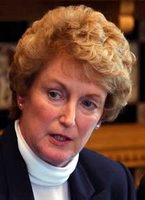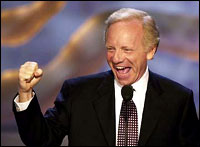If you think this image is funny, wait till you see the real thing. It might happen alot sooner than you think.
Short of a last minute intervention by Rove’s attorney, Special Prosecutor Patrick Fitzgerald is expected to ask a grand jury investigating the outing of CIA agent Valerie Plame Wilson to indict Deputy White House Chief of Staff Karl Rove for making false statements to the FBI and Justice Department investigators in October 2003, lawyers close to the case say.
Rove failed to tell investigators at the time that he had spoken about Plame to Time Magazine reporter Matthew Cooper and conservative columnist Robert Novak, both of whom later cooperated in the case. Novak outed Plame in a July 14, 2003 column.
The Chicago prosecutor briefed the second grand jury investigating the outing last week for more than three hours. During that time, he brought them up to speed on the latest developments involving Rove and at least one other White House official, the sources said. The attorneys refused to identify the second person.
As of Monday, neither Rove nor his attorney Robert Luskin has explained Rove’s misstatements to Fitzgerald’s satisfaction, those familiar with the case said. Eleventh-hour testimony from Time Magazine reporter Viveca Novak—who Rove’s attorney Robert Luskin fingered as a crucial witness in keeping his client out of court—does not appear to have been helpful in dodging an indictment, they added.
[...]
Over the past few weeks, the time frame when Fitzgerald became increasingly suspicious—specifically February 2004—has become crucial for Rove. He testified before Fitzgerald’s grand jury that month without revealing he had been a source for Cooper and Novak, saying only that he had shared information about Plame Wilson with other journalists—including Chris Matthews, the host of MSNBC’s Hardball—after her name had appeared in Novak’s column.
In a bid to keep Rove out of Fitzgerald’s crosshairs, Luskin recently told Fitzgerald that he had a conversation with Time Magazine reporter Viveca Novak in February 2004 where she inadvertently revealed that Rove had been a source for her colleague Matt Cooper. Luskin said this prompted an exhaustive search for the Hadley email which was promptly turned over to Fitzgerald and led Rove to change his testimony.
Luskin testified Dec. 2 that the Novak meeting took place in late January or early February 2004, the very month in which Fitzgerald had sought the authority to prosecute officials if they were found to have hindered his investigation into the leak.
Novak, however, testified that she met Luskin in either March or May 2004, those close to the case said. This discrepancy is at the crux of what Fitzgerald is investigating. Rove didn't reveal to the grand jury that he had spoken with Cooper until Oct. 15, 2004.
Luskin has said that Rove did not intentionally withhold information from Fitzgerald or the grand jury about his conversation with Cooper. Rather, he says Rove had simply forgotten about it, and Luskin’s meeting with Novak had jogged his memory.
Before Novak testified in a sworn deposition last week, Rove faced the prospect of being indicted on numerous counts, including obstruction of justice, perjury and making false statements for failing to disclose conversations he had with reporters about Plame Wilson, sources close to the case said. Several reporters close to Novak said they believe Luskin’s decision to draw her into the case was made to keep Rove’s indictment from being handed up on the day Libby was charged.
Rove could be indicted on those counts if Fitzgerald determines that Novak’s testimony did not go far enough in clearing up questions about why Rove did not tell investigators about his conversations with other reporters. Her testimony may, however, shield Rove from more serious charges, attorneys close to the case said.
Novak (who is not related to the conservative columnist Robert Novak, the journalist who first published Plame Wilson’s name and CIA status,) is the latest in a lengthy list of longtime Washington, D.C. reporters who have become embroiled in the leak investigation, and the third to have withheld crucial information from editors about her involvement while still reporting on the story.
[...]Novak said she inadvertently tipped Luskin off to the fact that Cooper's source was Rove. She said she sensed she was being spun by Luskin and her knee-jerk response led to her divulging information that could be used to help Rove escape serious charges.
Following his meeting with Novak, Luskin told Rove that Novak said he was Cooper’s source. Luskin and Rove then did an exhaustive search through White House phone logs and emails to find any evidence that Rove spoke with Cooper.
An email Rove sent to then-Deputy National Security Adviser Stephen Hadley just minutes after his conversation with Cooper in July 2003 turned up, and Luskin said he immediately turned it over to Fitzgerald.
Still, it’s unclear why that email wasn't found when White House counsel Alberto Gonzales ordered all White House staff in October 2003 to turn over emails and other documentary evidence that showed officials spoke with journalists. Moreover, it’s not known why Rove did not change his grand jury testimony to reflect that he had been Cooper’s source until October 2004, some six or eight months after Novak’s meeting with Luskin.
 The proper home for someone who's so full of bullshit.
The proper home for someone who's so full of bullshit.



















